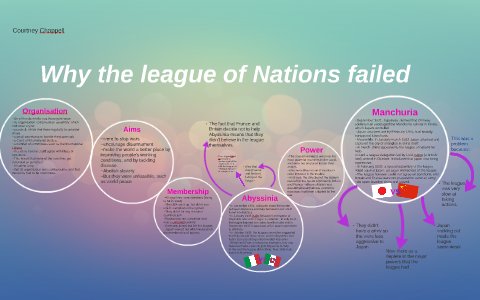The League of Nations, established in the aftermath of World War I, was a preliminary attempt at formalizing global governance and ensuring lasting peace. However, it ultimately faltered, leaving an indelible mark on international relations and prompting reflections within the Bahá’í community. The Bahá’í teachings, emphasizing unity, justice, and world peace, offer a profound perspective on why the League of Nations did not succeed. This analysis will elucidate the key factors contributing to the League’s failure, intersecting them with the principles enshrined in Bahá’í doctrine, thereby highlighting the lessons that can be distilled for contemporary global governance initiatives.
At the heart of Bahá’í philosophy is the concept of the oneness of humanity. This principle asserts that all humans are part of a single family, a notion diametrically opposed to the nationalistic fervor that pervaded the League’s operational framework. The League of Nations was conceived as a multinational entity aimed at fostering cooperation among states; however, it struggled to transcend the parochial interests of member nations. Divisions rooted in national pride and self-interest often superseded communal well-being, leading to a disjointed approach that was unable to effectively respond to international crises.
The first reason for the League’s ineffectiveness was its lack of authoritative power. The Bahá’í teachings advocate for a centralized authority capable of mediating disputes and enforcing resolutions with the backing of global consensus. The League, however, was impotent, lacking mechanisms to compel compliance among its members. This deficiency became painfully evident in the League’s responses to instances of aggression, such as the Japanese invasion of Manchuria in 1931. Instead of a decisive intervention, the League’s inaction reflected its inability to assert authority, culminating in the erosion of its credibility and effectiveness.
The Bahá’í perspective on justice further illuminates another pivotal shortcoming of the League. Justice, as a foundational tenet within Bahá’í teachings, emphasizes the importance of equitable treatment and fairness in addressing grievances. Many member states perceived the League’s judgments as biased or favoring particular nations, which galvanized resentment rather than fostering cooperation. The perception of injustice fractured coalitions and marginalized smaller nations, which felt that their voices were not adequately represented. This discord encapsulated one of the key failures of the League: its inability to embody a truly equitable system of governance.
Furthermore, the League’s structure was inherently flawed, as it failed to include major powers during its inception, such as the United States. The Bahá’í teachings underscore the necessity of inclusivity and collaboration among nations in pursuit of collective progress. A global governing body, according to Bahá’í principles, must welcome the participation of all nations—powerful and less powerful alike—fostering an environment of mutual respect and understanding. The absence of the U.S. not only weakened the League’s capabilities but also highlighted a critical shortcoming in its foundational design: a lack of universal representation that effectively disenfranchised collaborative efforts.
Another salient reason for the League’s dissolution lay in the inadequacy of its mechanisms for conflict resolution. The Bahá’í teachings advocate for the use of consultation and dialogue as paramount strategies for resolving disputes. Contrary to this approach, the League often resorted to ineffective negotiations devoid of genuine engagement with conflicting parties. The result was a series of stalled initiatives that failed to address the root causes of conflict. The ideological chasm that separated involved parties was not bridged through the League’s simplistic diplomatic overtures, leading to the inevitable ascendance of aggression and hostility in international relations.
Moreover, the League of Nations suffered from a severe lack of public support and understanding. The Bahá’í teachings maintain that a well-informed populace is crucial for the success of any governance structure. The League’s complex operations, abstract goals, and perceived elitism alienated a significant segment of the global community. Consequently, citizens were often either unaware of or disillusioned by the League’s objectives, which impeded collective action on a grassroots level. The Bahá’í emphasis on education and awareness parallels the need for a more engaged and informed citizenry that can support and influence global governance.
In examining the failure of the League of Nations through the lens of Bahá’í teachings, it is evident that future endeavors in global governance must prioritize unity, justice, inclusivity, and effective mechanisms for conflict resolution. These principles are not merely aspirational but are essential imperatives for fostering enduring peace and cooperation among nations. As humanity steps into an increasingly interconnected future, reimagining global governance structures to embody these Bahá’í principles will not only rectify past missteps but also pave the way for a more harmonious world.
Ultimately, the teachings of Bahá’u’lláh resonate with the contemporary challenges of global governance, urging an ongoing commitment to the ideals of justice, unity, and equitable representation. The lessons learned from the League of Nations should serve as a guiding framework for future initiatives, asserting that true governance requires more than mere institutional frameworks; it requires a profound dedication to the well-being of all humanity. Only through such commitments can we aspire to achieve the vision of a peaceful, interconnected global community.
